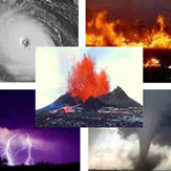
Blogs
How to help others when disaster strikes
The images of disasters pull on people’s heartstrings causing those outside of the impacted area to want to do something to help. Unfortunately, sometimes this kindness overwhelms agencies and organ...
Read More
Beware of Identity Thieves and Scam Artists after a Disaster
As government agencies and charitable groups continue to provide disaster assistance, con artists, identity thieves and other criminals may attempt to prey on vulnerable survivors. The most common po...
Read More
September 2022 National Preparedness Month resources
National Preparedness Month was created to encourage and promote family and community disaster planning during NPM and throughout the year. The 2022 NPM theme is A Lasting Legacy: "The life you’...
Read More
Hurricane Preparedness Week is May 1-7, 2022
Every year the NWS' Hurricane Preparedness Week helps families get prepared and be ready for hurricane season. The Pacific hurricane season starts May 15, and the Atlantic season (for now) starts...
Read More
Preparing for a Wildfire (mitigation and safety tips)
According to the National Park Service, as many as 90% of wildland fires in the United States are caused by humans. Some human-caused fires result from campfires left unattended, the burning of debri...
Read More
Tornadoes 101 (Tornado Basics, Video and Safety Info)
Most of us have seen a tornado on the news and the Internet, but a vast majority of people have never personally witnessed the power and destruction of a twister. The U.S. averages about 1,200 tornad...
Read More
How to prepare for and respond to an explosive device or bombing incident
Besides being vigilant and having good situational awareness, there are some things people can do to prepare for and respond to an explosive device or incident.
Read More
If you receive a bomb threat or suspicious package...
According to USPS, the likelihood of you ever receiving a bomb in the mail is remote, but are some unique signs or characteristics from the U.S. Postal Inspection Service that may help identify a &quo...
Read More
Dirty bomb or Radiological Dispersion Device (RDD) overview and safety tips
The main reasons for using a dirty bomb is to cause damage to buildings, contaminate an area, and spread fear or panic. The danger from a dirty bomb would be the blast itself - not necessarily radiati...
Read More
How to protect yourself from nuclear fallout (tips about radiation, building an expedient shelter and more)
Many think a nuclear attack is doomsday event where most would be killed on impact and survivors would want to die once they come out of shelters. In reality, unless you are actually at ground zero or...
Read More
- « Previous
- 1
- 2
- 3
- Next »
